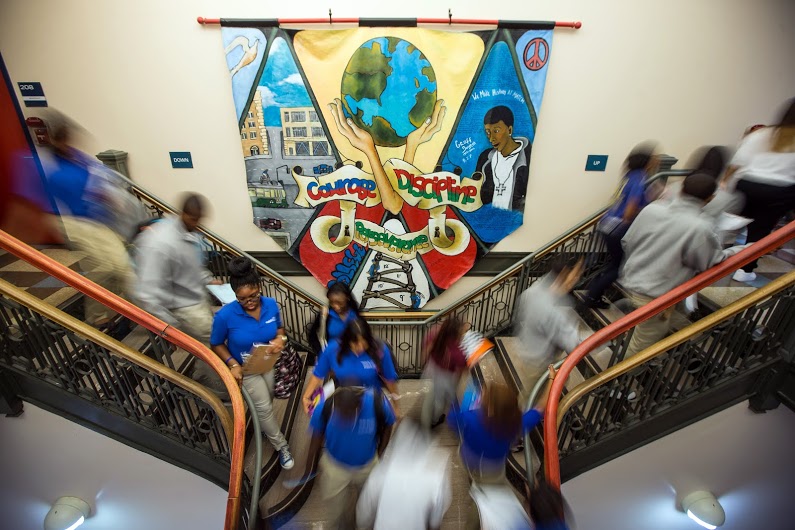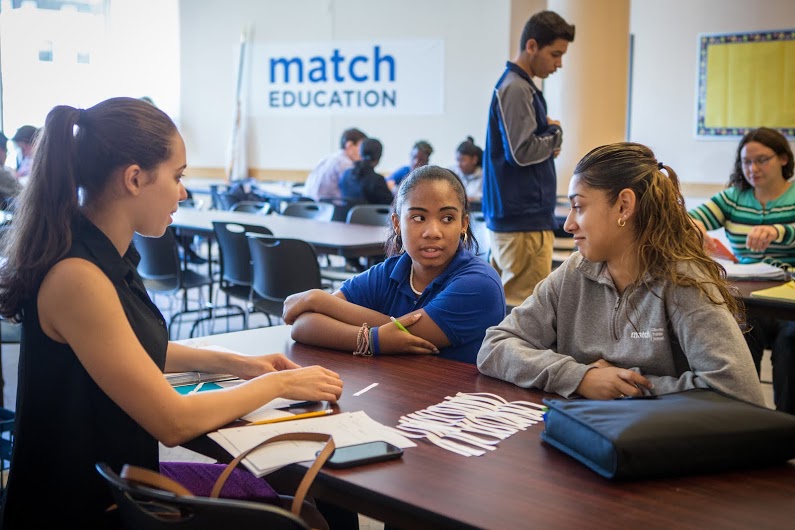Smartest kids: Massachusetts charter schools are few but mighty
Boston – A dreamy gaze washes over Lindsey Holmes’ face when she talks about going back to Detroit one day to open a performing arts school for boys.
It can happen, she insists. Her home state can become an academic standout when Michigan raises its standards and expectations to the level she’s seen in the state where she now lives – Massachusetts.
In a prelude to her dream, the recent Spelman College graduate chose first to study to become a teacher at the Match Teacher Residency, part of a highly aclaimed charter school program in Boston. That means that four days a week, Holmes, 21, gets dressed in a dorm-style room, heads down a flight of stairs, opens a door and emerges in the buzzing halls of Match High School.
She is among two dozen top-flight graduate students who literally live in the charter school and tutor students as part of their preparation for becoming a teacher. They take graduate-level classes on Fridays and Saturdays in the high school’s multi-purpose room.
The tutoring helps the high school students - many from low-income homes and immigrant families - get the academic support to excel. “We need it here because of the circumstances in the homes and in the neighborhoods.” Holmes said.
Match School Foundation, which started the Match elementary, middle and high charter schools in Boston, developed the graduate school and teacher training program. The daily tutoring these teachers-in-training provide in English and math is a huge reason the charter high school is one of the state’s top performers.
“We try to create opportunities to simulate teaching,” said Orin Gutlerner, founding director of the teacher residency program. “It’s the best way to train someone for a performance-based job.”
Match excels in a state known for innovative, high-performing charter schools. Indeed, most Massachusetts charter schools are considered high performing or fast-improving. In contrast, Michigan’s rapidly expanding universe of for- and nonprofit charters have produced hundreds of schools that have performed no better than traditional public schools.
Though Massachusetts and Michigan approved charter schools in 1993, gulf between charter performance and practices in the two states is vast:
- Massachusetts charter schools are often ranked among the best schools in the state, with most outperforming traditional public schools in their area. In Michigan, nearly 4-in-10 Michigan charters performed in the bottom 25 percent of all schools in the state, and only 27 (of 300) ranked in the top 25 percent
- Massachusetts set stringent quality standards for its charter schools, while standards vary in Michigan because they are set by individual charter authorizers.
- Massachusetts has 82 charter schools with a cap of 120. Michigan has roughly 300 charter schools with no cap on continued expansion.
- In Michigan, any public school district, community college or university can authorize charter schools to open, resulting in dozens of authorizers with differing standards. Massachusetts has a single authorizer – the state board of education.
- Massachusetts requires those applying to open a charter school in low-income areas to have a proven track record of success. The state gives charters five years to excel, or face closure. Michigan has no such requirements.
- Massachusetts education leaders cite the strict standards as a possible reason the state has only one for-profit management company that runs three charter schools. Roughly 61 percent of Michigan’s 300 charter schools are run by for-profit ventures.
Massachusetts charters embrace the same “no excuses” performance standards as traditional public schools, no matter a student’s background, said Cliff Chuang, Associate Commissioner for Charter Schools and School Redesign in Massachusetts.
“We don’t allow underperformance to persist,” he said.
Quality meets Innovation
At Match High School in Boston, students don’t have to wait to get to college – they are surrounded by it. Located on the Boston University campus amid cafes and tiny theaters, Match is in a narrow, vertical building that used to be a car dealership in the early 1900s.
There’s no gym in the building. No football team.
The school day and year are longer than in traditional public schools. It gives all students time to take advanced placement classes. Last school year, more than half scored high enough on an AP exam to earn college credit. About 78 percent of the students come from low-income families, 97 percent are students of color and many take a bus and the subway an hour each way for school.
They do it because this high school is one of the best in the state, beating suburban, higher income schools on the tough Massachusetts Comprehensive Assessment System (MCAS) exam required for graduation.
Last year, every 10th grader at the school passed the MCAS high school English exit exam (compared to 91 percent statewide), 93 percent did so in math (compared to 80 percent statewide).
It’s no easy feat to score ahead of the pack in Massachusetts – the state has earned a reputation as an educational alpha dog, leading the nation on the National Assessment of Educational Progress (NAEP) tests for the past decade and scored near the top of the world on the international TIMSS tests in 2011.
Match’s success is nurtured by the symbiotic relationship between its students and their in-school tutors who are studying to lead a classroom one day. The extended daily tutoring helps the mostly low-income students thrive, and the high-functioning environment is a good place for tutors to learn to be teachers.
A unique teacher program
The Match School Foundation Inc., started the residency program as part of its Sposato Graduate School of Education. The graduate school is not linked to a college or university, but was approved in 2012 by the Massachusetts Board of Higher Education. The Match selection process is more demanding than teacher training programs at Harvard and Teach for America, said Gutlerner, who is former director of Harvard’s Undergraduate Teacher Education Program.
This year Match accepted 135 recent graduates as tutors from colleges that included Harvard, Brown, Colgate and Princeton. During the first year, they are paid about $15,000 to work for the Match Corps tutoring program and are expected to earn a teaching certificate.
The payoff for Match’s high school students has been impressive. In 2005, the year the Match Corps started tutoring, the percentage of 10th graders passing the MCAS increased from roughly 70 percent to 95 percent. That dwarfed the 40 percent overall passage rate in Boston Public Schools.
The two-thirds of teacher trainees who typically make it through the first year of the program spend the second year employed in a public school while completing requirements for a master’s degree in effective teaching.
Graduates leave the program with a teaching certificate, a Master’s degree and an average of only $7,000 of debt.
The results have brought national attention, with Match’s consulting arm being recruited to help start tutoring programs in Houston and Chicago. Charter school groups in New Orleans partnered with Match to bring its teacher training model to that city.
In Michigan, New Paradigm for Education, a nonprofit that runs a high-achieving charter high school in Detroit, also contacted Match.
Stig Leschly, chief executive officer of Match, and a former technical advisor to Jeff Bezos at Amazon, said the charter’s tutoring model can be successfully replicated in Michigan.
“We have an emerging body of evidence that districts can do this ... get 23-year-olds, train them up and get them to tutor math,” Leschly said.
How? The same way Match helped Chicago train and employ tutors for 1,000 at-risk boys. It takes local district funding - and more. “You need to get philanthropy to fund it,” he said.
Boston charters top the charts
Overall, Boston charter schools have the fastest student growth rate on standardized tests of any city or state in the nation, according to the Center for Research on Education Outcomes (CREDO) at Stanford University. The CREDO study, “Charter school performance in Massachusetts,” found that charter school students in Boston are learning at double the rate of Boston students in traditional public schools, achieving two years of academic progress in English and math for every year they’re enrolled in a charter (compared with district students in traditional public schools).
Statewide, 44 percent of Massachusetts charter schools have significantly more positive learning gains than the traditional charter public schools in their local area in reading, while 13 percent of charter schools have significantly lower learning gains. In math, 56 percent of the charter schools studied outperform their peers and 17 percent perform worse, CREDO found.
A 2011 study by the Center for Education Policy at Harvard University attributed the improvement to longer school days, more instructional time in reading and math, and a “no excuses” philosophy that maintains all children can learn with support, challenging studies showing that family income, race, gender or special needs tend to produce lower student achievement.
Charter schools in Massachusetts are so successful that suburban and more affluent school districts in Massachusetts lobbied this past summer to increase the number of charter schools allowed in hopes that more would open in the suburbs.
Chuang, the head of the state’s charter school office, said that limiting the number of charter schools “increases the level of rigor” by creating more competition for slots when they come open, making it more likely that only the highest quality providers open schools.
A grand bargain
Massachusetts’ 1993 education reforms included a deal creating the state’s first charter schools. As part of that “grand bargain,” charters authorized by the state would operate under five-year permits granted by the state board of education. If a charter does not demonstrate good results within that time it risked being closed.
This threat has proven more than theoretical. In the two decades since, of the 102 charter schools that have opened in Massachusetts, the state has shut down 20, Chuang said.
The state gives new charters up to $750,000 in start-up funds. Chuang said this makes new charter schools less likely to turn to for-profit companies to get the school running.
“It’s really, really hard to get a charter, but once you get a charter we automatically give you that grant support,” Chuang said. “We can guarantee the feds that anyone who gets the grant money is of the highest quality or we’d not give them a charter.”
There is only one for-profit management company, SABIS Educational System, http://usa.sabis.net/ that operates in Massachusetts, running three schools. Chuang said, together, the standards and grants result in schools that are driven more by academic mission than profit.
“With a management company, you’re immediately indebted” to do things the company’s way, Chuang said. “How can you fire or hold accountable an entity that keeps you alive” financially?
No charter is immune from tight state control. Massachusetts even sent a warning to the high-performing Match group of charter schools this year. The state instructed Match to take better care to ensure the finances for its publicly-funded charter schools are kept separate from its privately-financed businesses.
Michigan has no such requirement.
Fruits of Innovation
Students say the tutoring program at Match works because the tutors can relate to the six to 12 students they help each day.
Charly Simpson, a senior, recalled how in the 7th grade her favorite tutor consoled her as she struggled with her parents’ divorce. Also a child of divorce, the tutor introduced Charly to the writings of Maya Angelou and Toni Morrison.
Senior J’Karah Brown was in sixth grade when her tutor took her to the hallway so she could talk about troubles at home.
“When you have a lot of emotions, you can’t focus, you get lazy. My grades went down significantly. I thought they were going to hold me back,” Brown said. “She was a shoulder to lean on. She let me vent. Then I got to work.”
Lindsay Holmes, the graduate student from Detroit, said in the first week of school one of her students blurted out some heavy family problems. She said it confirmed her belief that the tutoring program fills a gap. And pushes Match kids to succeed.
“We understand the focus is academics, but we understand it’s about the holistic person; we focus on developing grit, perseverance, curiosity,” she said. “It’s all hands on deck here.
“These kids deserve it.”
Michigan Education Watch
Michigan Education Watch is made possible by generous financial support from:
Subscribe to Michigan Health Watch
See what new members are saying about why they donated to Bridge Michigan:
- “In order for this information to be accurate and unbiased it must be underwritten by its readers, not by special interests.” - Larry S.
- “Not many other media sources report on the topics Bridge does.” - Susan B.
- “Your journalism is outstanding and rare these days.” - Mark S.
If you want to ensure the future of nonpartisan, nonprofit Michigan journalism, please become a member today. You, too, will be asked why you donated and maybe we'll feature your quote next time!


 The mostly low-income students at the Match Public Charter High School in Boston are achieving extraordinary gains through longer class days, two hours of daily tutoring and other reforms. (photo by Aram Boghosian)
The mostly low-income students at the Match Public Charter High School in Boston are achieving extraordinary gains through longer class days, two hours of daily tutoring and other reforms. (photo by Aram Boghosian) Tutor and teacher-in-training Francheska Jimenez works with two students at Match Public Charter High School in Boston. Tutors say the support they can give teenagers in their daily lives is sometimes just as critical as the academic help they provide. (photo by Aram Boghosian)
Tutor and teacher-in-training Francheska Jimenez works with two students at Match Public Charter High School in Boston. Tutors say the support they can give teenagers in their daily lives is sometimes just as critical as the academic help they provide. (photo by Aram Boghosian) Match charter CEO Stig Leschly said the school’s influential tutoring program can be replicated in Michigan, but would almost certainly need support from philanthropy. (photo by Aram Boghosian)
Match charter CEO Stig Leschly said the school’s influential tutoring program can be replicated in Michigan, but would almost certainly need support from philanthropy. (photo by Aram Boghosian)